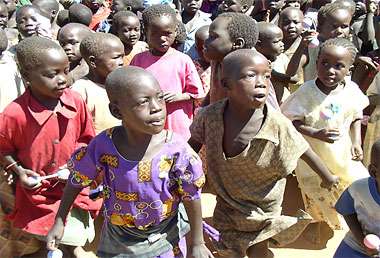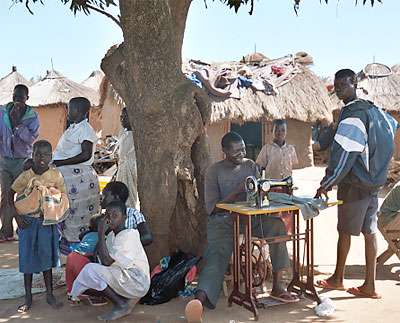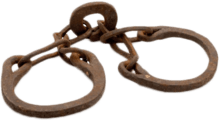Sexual exploitation of Ugandan refugees
| Part of a series on |
| Violence against women |
|---|
| Issues |
|
| Killing |
| Sexual assault and rape |
| Related topics |
Overview
Uganda has over 234,000 refugees and 65 percent are from Democratic Republic of Congo and South Sudan.[1] The other refugees in Uganda come from Ethiopia, Somalia, Eritrea, Burundi, and Rwanda.[2]
Overall situation
Some of the refugees in Ugandan camps are sexually harassed and beaten. These include mostly women, girls and few boys who are between the ages of 14 and 25. These harassments happen across the different refugee settlements in Uganda. These are sexually harassed and beaten. A survey conducted by Pan African Development Education and Advocacy Programme (PADEAP) in 2012 under the country director; Michael Mafabi revealed that 70% of the women experienced one form of violence, more so with about 45% of them being sexually abused.[1] According to Mafabi, the victims rarely report these incidences because the culprits have power over them.[1] These culprits are the people who provide relief to these refugees. Also, Mafabi indicates that when some of these victims go to report, they are harassed in exchange for services.[1]
Causes
Debanjana Choudhuri who visited one of the camps in Uganda has reported that according to the data she got, girls frequently experience coerced sexual initiation which they view it as a normal form of relationships.[3] Another source mentioned that culture and religion influence refugees to be victims of abuse and the fact that they fear to be embarrassed if they say anything against what they are experiencing.[4]
Culprits
The culprits are a secretive network of pimps operating in Uganda. The group mostly spread information about their business through word of mouth. They have been advertising refugee women and girls to buyers, some of whom are high-ranking government officials.[5]
Victims
One of the victims of sexual harassment include a girl who flee from South Sudan camp after being raped , only to be raped again in Ugandan camps. She explained that she lives alone and a lot of men come to her area at night and she gets scared. According to the source, there is nothing much she could have done to prevent herself from being raped because she lives in a tent that does not have a door.More other girls who experienced the same thing as the one form South Sudan claimed that they also live in fear of being attacked by men.[6]
Refugee camps in Uganda
- Achol-Pii Refugee Settlement
- Bidi Bidi Refugee Settlement
- IMVEPI Refugee settlement[7]
- Kiryandongo Refugee Settlement
- Kyaka II Refugee Settlement
- Kyangwali Refugee Settlement
- Nakivale Refugee Settlement
- Palabek Refugee Settlement
- Pagirinya Refugee Settlement[7]
- Rhino Camp Refugee Settlement
- Rwamwanja Refugee Settlement
Combating
The United Nation's Officials told the Advance Family Planning that Uganda must investigate allegations of human trafficking and corruption in the refugees camps[8]. The UN resident in Uganda Rosa Malango claimed that she had written to the government about the allegations ranging from corruption to fraud and trafficking of women and girls to intimidation and harassment of UN personnel[8]. She also claimed that the Ugandan government authorities made promises to investigate cases that involve "the moment anybody raises anything that looks or smells like sexual exploitation or abuse I must demand for an immediate investigation, and I must demand for immediate action because we have zero tolerance.”[8] She added that the UN refugee agency and the World Foood Programme are making some internal audits of the Uganda operations in order to monitor the allegations of corruption. [8]
See also
References
- 1 2 3 4 "Refugee women in Uganda suffer sex abuse". Retrieved 20 April 2018.
- ↑ "Refugees in Uganda". Retrieved 24 April 2018.
- ↑ Choudhuri, Debanjana. "My Visit To A Ugandan Refugee Camp: Tackling Gender-Based Violence And HIV".
- ↑ Jeff and Dennis, Lule and Dibele. "Refugee women and children in different settlements around the country, continue to be exposed to sexual abuse, allegedly by some humanitarian service providers and security officials".
- ↑ "Sex Scandal: Underage Refugee Girls Forced Into Prostitution in Uganda, Report Reveals". newsweek. Retrieved 24 April 2018.
- ↑ "Girls flee sexual violence in South Sudan only to be raped again in refugee camp".
- 1 2 "Testimonies from Imvepi Refugee Camp, Arua". Retrieved 24 April 2018.
- 1 2 3 4 "UN urges Uganda to probe refugee trafficking, corruption". Retrieved 20 April 2018.
External links
Gallery


